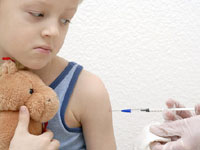Researches deny link of autism with vaccines
Government and mass media are worried about the increased cases of autism among children. The number of autism diagnoses has grown in recent decades.

Autism is a brain development disorder that impairs social interaction and communication, and causes restricted and repetitive behavior, all starting before a child is three years old.
Senator John McCain asserts that “that it’s got to do with a preservative in vaccines.” Some parents’ groups and lawmakers go further; they say that the preservative, which contains mercury and is called thimerosal, has caused an epidemic of new autism cases.
At the same time most mainstream researchers strongly disagree.
Several large-scale studies have found no evidence of a link between an antiseptic and antifungal agent, thimerosal, and autism, and medical groups such as the Centers for Disease Control and Prevention and the Institute of Medicine publicly stated as much. In January, California reported an increase in autism cases, despite the removal of thimerosal from most vaccines.
In February, an international team of researchers, analyzing blood samples from vaccinated children, found that blood levels of ethyl mercury “fell rapidly and had largely returned to baseline levels by Day 11 after vaccination.” Those levels fell much more rapidly, for instance, than levels of the mercury people absorb by eating fish — suggesting that the injected thimerosal is less likely to build up in the blood, the researchers concluded.
Still, the parent groups raising concerns about the dangers of vaccines have not taken a different view, and if anything have become more skeptical of government pronouncements on the issue.
Autism affects many parts of the brain; how this occurs is poorly understood. Parents usually notice signs in the first two years of their child's life. Early behavioral or cognitive intervention can help children gain self-care, social, and communication skills. There is no cure. Few children with autism live independently after reaching adulthood, but some become successful, and an autistic culture has developed, with some seeking a cure and others believing that autism is a condition rather than a disorder.
Subscribe to Pravda.Ru Telegram channel, Facebook, RSS!


